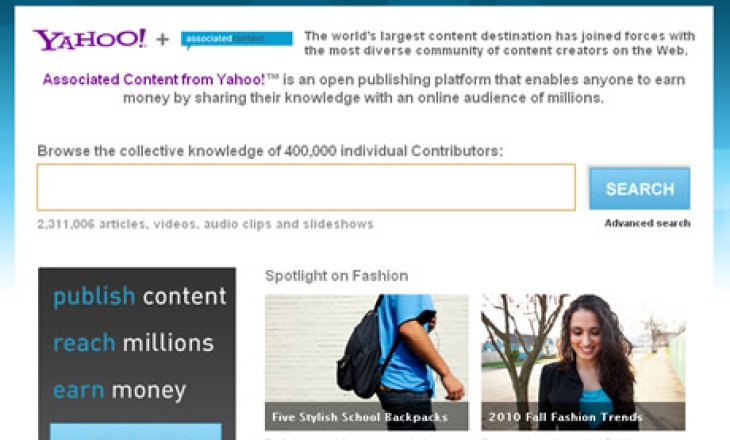It’s not just job-threatened journalists who are worried about the rise of low cost content generators like Demand Media and Associated Content. A group of established content syndicators are concerned enough by these companies’ growing clout–and what they see as diminishing content standards on the Internet-that they are looking to do something about it.
Officials from the three-year-old Internet Content Syndication Council (CSC), which includes members such as Procter & Gamble, Reuters and The Tribune Company, are circulating a document that could eventually evolve into an official doctrine on online content syndication. It’s early in the process, but ICSC leaders are exploring whether its members are interested in creating some sort of public set of quality guidelines for Internet content—or perhaps even an accreditation process for syndicated content.
Some in the organization believe that the quality of Web content has been cheapened by companies like Demand and Associated Content, which often employ low-paid freelancers. They specifically want to call more attention to the ability of these content generators to seed their articles through search, which in their eyes squeezes out professionally produced content.
“What concerns us is that most of these new content syndicators are producing low-quality articles that are link based,” said Tim Duncan, the ICSC’s recently installed executive director. “They are designed to score high on search. That drives down high quality content.” That dynamic doesn’t just make it tougher for traditional content syndicators to succeed; it actually makes the Internet less valuable by junking up search engines. “We want to preserve the utility of the Internet,” he said.
Some ICSC members have even advocated reaching out to Google to urge the search giant to tweak its algorithm to give more weight to content quality in its search results. Executives from Google declined to comment, but a spokesperson did release a statement. "Our search algorithms are designed to surface the most relevant web content for our users. Of course, content quality, broadly defined, is a key component of this. While we can't get into the specifics, we look at over 200 unique signals to rank Web pages, and these change nearly every week."
Besides search, the ICSC also wants to reach out to two key constituencies: publishers who regularly syndicate content and brands that frequently advertise alongside such content. Their message is basically, be careful, because you get what you pay for.
“This is not about any specific company, but publishers have to be careful about what they put on their websites,” said Andrew Susman, CEO of Studio One, which syndicates lifestyle articles to over 600 sites, including local TV station Web sites for all four of the major broadcast networks. “If they put sloppy or inaccurate content on their sites, over time, those sites will simply lose traffic. It’s not our right to tell publishers what they should carry. But there is an aggregate effect. Low quality content can pollute the information ecosystem.”
Executives from Associated Content, which was recently purchased by Yahoo, were unavailable to comment, while Demand Media officials declined. It’s likely that both companies would defend their content’s quality; they might also point out that much of the content they produce is used on their owned and operated sites and is not distributed elsewhere. Still, as more traditional brands consider advertising with these companies, the ICSC wants to plant the quality question in their minds. “Many advertisers are concerned about content quality,” argues Duncan. “It does matter.”
The content argument does seem to matter to several ICSC members, who are weighing whether to push for a formal set of guidelines. “We are concerned about it,” said Steve Tippie, vp of licensing and market development for Tribune Media Services, who added that the ICSC is expected to meet to discuss the subject in a few weeks. “We do see bad content, inaccurate, or poorly written content squeezing out the good stuff.”
Tippie mentioned a recent example that involved his company’s announcement that the Little Orphan Annie was set to end. He noticed that an article about Annie written by Cathy Montville, Associated Content’s Food and Wine Contributor, had cracked the top ten during several searches he conducted. “It was a cut and paste job, with tortured syntax,” he said. “It popped up above so many other rich good articles about the Annie news.”
“It’s very good that ICSC is at least raising the issue in a logical rational way,” Tippie added. “They are not in a panic mood.”
ICSC members don’t seem to want to come off as alarmist, or behind the media curve. “I’m not saying we wouldn’t do media buys with [an Associated Content or Demand], said Ken Zinn, digital Marketing Manager at P&G. “But P&G has really important brand names with good quality associated with them. We want to sponsor content of equal quality.” Added Zinn: “I’m not certain of the quality of some of the content out there. I don’t want to sponsor content that was produced by someone who just has a high school education.”










